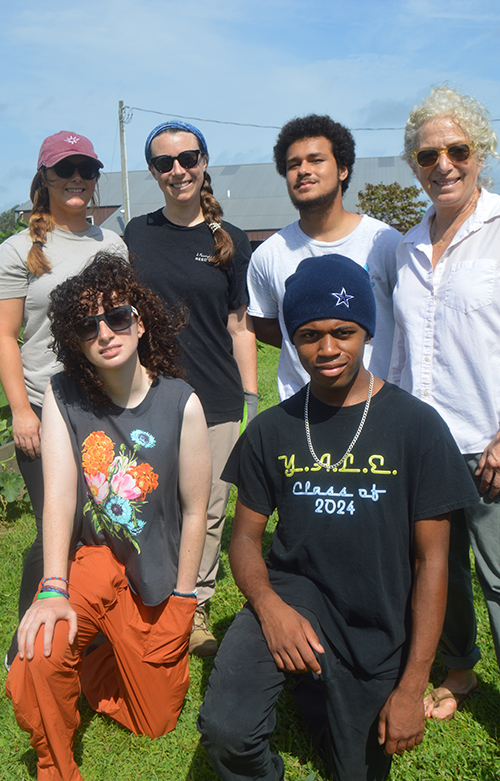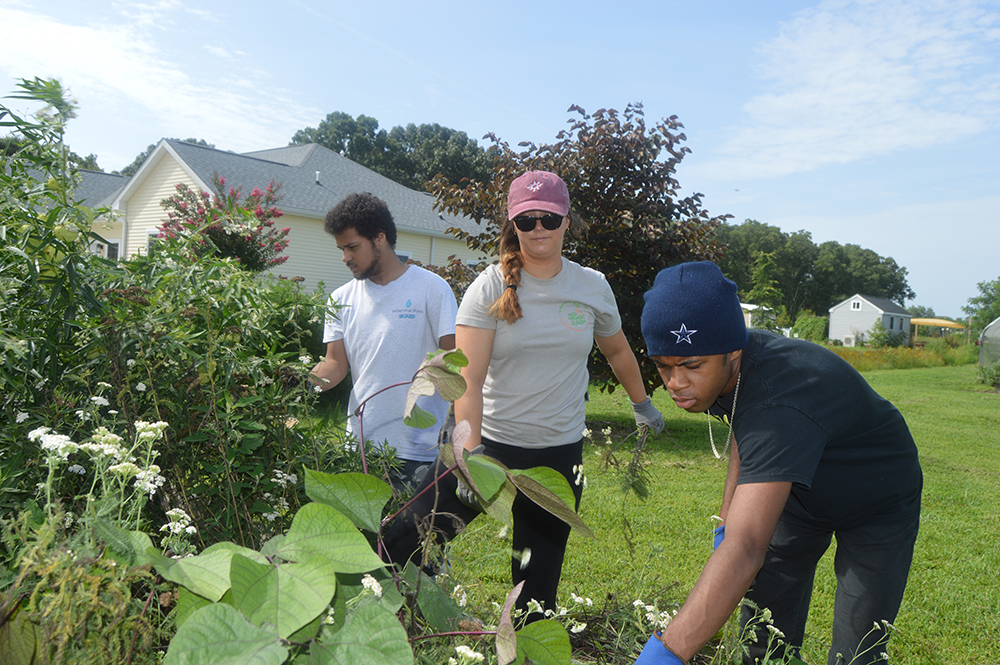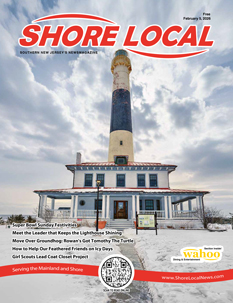By Marjorie Preston
Young people are learning real-world job skills in the great outdoors on this EHT farm.
Visit Reed’s Organic Farm on any given day, and you’re likely to see young people out among the fields, rowing and hoeing, seeding and weeding, and otherwise coaxing the harvest from the land.
Most will never work in agriculture in any way. But all are learning lessons in persistence, cooperation and follow-through—virtues that will equip them for success in life, whatever their path.
For more than a century, members of the Reed family worked these green acres, in a rural corner of Egg Harbor Township. But in 2014, when the last generation of farmers passed on, the 80-acre property was at risk of being sold for development. That’s when Cookie Till stepped in.
“I worried the farm would end up another subdivision with a hundred houses,” says the restaurateur and community activist, who once bought corn, tomatoes, and other produce from the farmstand, run by the late Bill and Bob Reed.
“So I said, ‘Please don’t sell until you talk to me.”

(Clockwise from upper right): Cookie Till, executive director and founder of A Meaningful Purpose at Reed’s Farm; intern Ja’siah; intern Mia Palmer; community program manager Jenny Reed; programming director Melanie Reed; and intern Max.
‘The Mother Ship’
“Obviously my passion is feeding people good food,” continues Till, owner of the award-winning Steve & Cookies in Margate. “Before this, I had started school gardens and educational programs about eating well and empowering people to choose what’s positive for their health.
“Fast forward to the farm, and I thought, ‘This could be the mother ship.’”
In 2019, she formed a nonprofit, A Meaningful Purpose. Its goal: to recreate Reed’s as an experiment in and model of sustainable agriculture, as well as a community hub and a training ground for young people preparing to enter the workforce.
Here local high schoolers learn practical, real-world skills in gardening, culinary arts, customer service, and animal husbandry (Reed’s hosts a small rescue sanctuary, with horses, pigs, alpacas, and a donkey). They also learn respect for nature in the most natural of settings, spending healthy, screen-free time in the great outdoors.
“That was a component from the beginning,” says Till. “Just being in nature for kids is so healing.”
On a recent morning, a group of students pulled and trimmed garlic bulbs and onions for later sale in the farm market. Other jobs include prepping ingredients for food prepared in the farm kitchen.
“Very few people are interested in becoming farmers,” says Melanie Reed, programming director, who is no relation to the original farm owners. “So we try to incorporate as many other career skills as we can. We’re always practicing ‘soft skills’ of teamwork, showing up on time, independence, and following directions. These are transferable skills that apply in any job.”
One student, Max, a three-year veteran of the summer program, may soon transition from a garden internship to a paid position in the farm kitchen. While he hasn’t determined his future career yet, Max has a knack for tinkering, and likes the kind of physical exertion that comes with farming.
“When I was little, I used to take apart everything,” he says. “As long as I’m hands-on, I’m satisfied.”
Intern Ja’siah actually enjoys the part of gardening most prefer to avoid: pulling weeds. He’ll never need it in his chosen profession—he aspires to play in the NBA, like his favorite, LeBron James—but it will always come in handy in his grandmother’s backyard patch.

Community program manager Jenny Reed works the fields with interns Ja’siah and Max.
Cream of the Crop
Reed’s also welcome students with developmental disabilities. Here, they can build a track record of success on the job that serves as a springboard to future employment.
This part of the program addresses a critical need, says Reed, as 85 percent of adults with developmental disabilities do not have steady employment.
“There’s a range of reasons. It could be lower expectations of success. It could be trying and failing to secure a job in the past. Some people have more significant disabilities, which make it challenging to maintain employment.”
But given a chance and the right accommodations, many could excel in the workplace and, by extension, in life. It’s a benefit for employers too. According to a 2023 study from research consultancy Accenture, companies that hire disabled people generate more revenue, net income and profit, and get higher scores for workplace satisfaction. They’re also 25 percent more likely to outperform their peers on productivity, measured by revenue per employee.
When it comes to productivity and commitment to the job at hand, it’s unlikely anyone could outperform Mia Palmer, of Ocean City High School. Mia not only works at Reed’s, but this summer has deftly juggled two other jobs, at a Ventnor deli and the Other Lucy Beach Grille in Margate. The ambitious Upper Township teen is also an athlete and Special Olympian who competes in track and cycling. She’s a competitive bowler, too.
Asked about her career goals, Mia says, “I honestly don’t know yet, but I like being busy. I enjoy being here on the farm.”
The educational program at Reed’s is funded through the state Department of Vocational and Rehabilitative Services, and run through a partnership with JEVS hireability, a Philadelphia-based job coaching agency.
Daryl Blithe, lead community employment specialist for JEVS, has seen program participants evolve for the better doing hard, gritty work, and holding the fruits of their labor in their hands. “They learn teamwork, communication, respect,” he says. “And this place covers it all.”
“We’re all proud of the work we do,” says Reed. “It’s mutual. We help them, and they help us.”
Marjorie Preston is a business writer, editor, ghostwriter and compulsive reader, who gobbles up books like potato chips. For more information (and more book reviews), visit marjorieprestonwriting.com.












